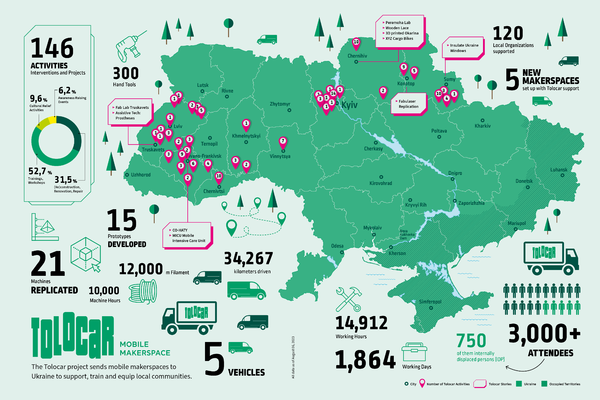Toloka is a traditional way of showing solidarity through the provision of physical support in Ukraine. With that in mind, German and Ukrainian partners with support from the Deutsche Gesellschaft für Internationale Zusammenarbeit (GIZ) co-created the Tolocar project just a few weeks after the start of the full-scale Russian* invasion of Ukraine. The goal of the project is to support both the emergency relief activities, and the development of a participatory innovation ecosystem for the socio-economic recovery of Ukraine.
With a fleet of mobile makerspaces at its core, Tolocar brings together experts from the fields of making, distributed manufacturing, and urban planning with civil society organizations in Ukraine to:
▶ Harness Ukraine's digital innovation capacity to meet urgent humanitarian needs
▶ Strengthen decentralized production systems at partner locations, such as displaced businesses, makerspaces or community workshops
▶ Support both new and existing stationary makerspaces
▶ Develop the capacities of Ukrainian makers and makerspace managers
▶ Expand the reach of Ukrainian makers by connecting them to national, regional, and global maker networks
This book is written with two audiences in mind: As an unprecedented project, we lacked a road map that we could turn to - so we wrote one for other practitioners. Furthermore, the process of producing the playbook allowed us to reflect on the potential of mobile makerspaces to make a significant impact at relatively low costs. Our aspiration is to position mobile makerspaces as valuable instruments for those funding innovative humanitarian emergency responses and development cooperation globally.

A playbook is a collection of strategies, tactics and moves of a (sports) team, and thus by definition not meant to be normative or prescriptive in any and every situation. This playbook thus reflects our iterative and pluralistic approach. By offering our best practices, lessons learned, as well as specific challenges that we faced and solutions that we came up with (sometimes through multiple iterations) we aim to initiate conversations with others who are interested in the topic: makers, humanitarian and development practitioners, researchers, product and process innovators, civil society organizations and the private sector.
Our conversation starts with Why Tolocar in order to lay the foundation by introducing key terminology, as well as the concept of distributed manufacturing and its requisite enabling technologies. Our approach How To Tolocar is detailed in the second part of the playbook along with insights into our fleet and team, and our comprehensive checklist. We illustrate the impact of the Tolocar project on Ukrainian makers and civil society through Tolocar Stories. Here we focus on various interventions in diverse locations, spanning over a year of operation within a nation fighting against the invasion of its former imperialist ruler.
Finally, we provide an outlook on our future plans to support the Ukrainian innovation ecosystem for the inclusive socio-economic recovery of the country - and how we hope that the Tolocar project will inspire others worldwide.
The Playbook is available as a PDF via the website of the Tolocar project reflecting the status of the project in August 2023. Thanks to Appropedia, the playbook is also a living document that will evolve as the project progresses. We encourage continuous learning, experimentation, and adaptation to achieve sustainable and impactful outcomes. Please join the conversation online!
This publication contains links to external sites. Responsibility for the content of the external sites linked to this website always lies with their respective publishers. When the links to these sites were first posted, GIZ checked the third-party content to establish whether it could give rise to civil or criminal liability. However, the constant review of the linked external sites cannot reasonably be expected without concrete indication of a violation of rights. If GIZ itself becomes aware or is notified by a third party that a linked external site gives rise to civil or criminal liability, it will remove the link to this site immediately. GIZ expressly dissociates itself from such content.
Contents[edit | edit source]
Forewords
- Foreword by Jochen Flasbarth, State Secretary in the Federal Ministry for Economic Cooperation and Development, Germany ©
- Foreword by Valeriya Ionan, Deputy Minister for Eurointegration at the Ministry of Digital Transformation of Ukraine ©
- Foreword by Daniel Busche, GIZ Country Director Ukraine ©
- Foreword by Neil Gershenfeld, Director of MIT's Center for Bits and Atoms, and Chairperson of Fab Foundation
- Getting Started in Making: Key Terms
- Mobile Makerspaces
- Tolocars: Versatile Mobile Makerspaces
- Virtual Toloka: Distributed Manufacturing
- Crafting Resilience: The Ukrainian Maker Movement in 2022
- Make Things that Make Sense. Anywhere
- Driving Success through Collaboration — The Tolocar Team
- Our Fleet — The Truck
- Our Fleet — The Van
- Checklist
- Maker Academy
- Creativity, Culture, Compassion
- Open Lab Starter Kit: Enabling Open Innovation in Konotop
- Windows of Hope
- Converting a Bus into a Mobile Intensive Care Unit (MICU)
- Transforming Truskavets Together
- CO-HATY: Building Futures with Love
Outlook: Exploring New Horizons with Tolocars in Ukraine and Beyond
*We are aware that in Ukraine, the convention is now to use lowercase letters: "russia". As a federally owned enterprise, GIZ follows the spelling of the country list of the German Federal Foreign Office.

